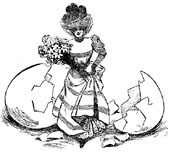
“Raising Awareness”: Reducing Philanthropy to Vanity
CULTURAL COUNTERPOINT
By any measure, the U.S. is the most charitable nation on earth. A recent Washington Examiner article, for example, highlighting the findings of the Almanac of American Philanthropy, reported that Americans out-donate Canadians and Britons two-to-one, and Italians and Germans 20-to-one. Among our countrymen, “more than half of every single income class except those earning less than $25,000 donate to charity.” If the ideal everywhere is to give until it hurts, then Americans have a much higher tolerance for pain.
This is not a new trend. Alexis de Tocqueville, the French social thinker and philosopher of American life, observed in Democracy in America (1835) that civic institutions were a defining feature of the early Republic. If something needed doing, then Americans banded together to do it. If someone needed help, everyone tended to pitch in. Native American hospitality and Old World communitarianism blended beautifully on the vast North American continent.
Though it has been a constant among Americans to give of their time, fortune, talents, and even life-blood, the way in which this has been done has changed dramatically. The U.S. is a Protestant nation, after all, and biblical injunctions against ostentation in giving (cf. Mt. 6:2-4) and commands to pray and fast in secret (cf. Mt 6:6) helped temper the temptations of human pride. The heart craves approbation, but the Bible teaches us that the heart is not always to be trusted.
As American Christianity collapsed and society coarsened, however, the old restraints on our fallen natures loosened and fell away. Where once the Bible and Christian decency worked against the tendency to “toot our own horn” as we passed through the streets giving out alms, post-Christian America lurches toward high liberalism and secularism, of which self-congratulation is a distinguishing characteristic.
You May Also Enjoy
What advice would a politically correct contemporary American publisher give to Charles Dickens regarding A Christmas Carol?
The founders of Massachusetts believed, Miller says, “that ultimately all the world would imitate New England.”
It is a cruel irony that, in less than a century, Catholics have gone from being victimized as unwelcome immigrants to being widely perceived as racist victimizers.

